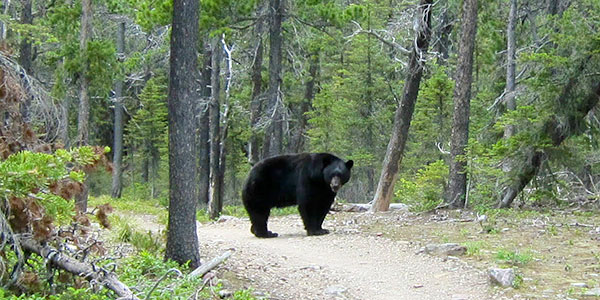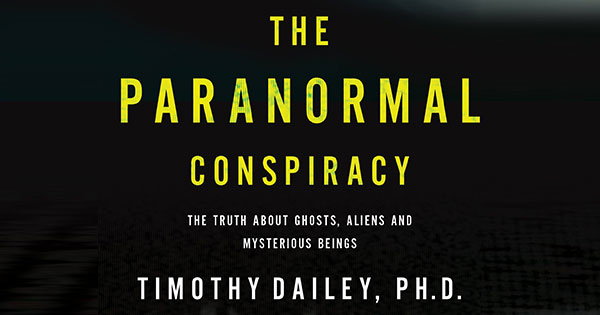I’m a skeptic. Perhaps not quite skeptical enough for my atheist friends, but nevertheless I’m extremely dubious about claims of paranormal and supernatural experience. The Ouija board doesn’t work for me, I’ve never seen a UFO, and though I go hiking in the mountains almost every weekend, I’ve never run across Bigfoot. Bears: yes. Bigfoot: no.

A black bear (not Bigfoot) I encountered last month in Glacier National Park
But despite that lack of personal experience, I find accounts of the supernatural fascinating, not necessarily because I think they’re real, but because of what they say about ourselves. We all seem to long for something more: to discover we’re not alone in the universe, to be able to communicate with a deceased relative, to experience something that transcends the mundane physical world of the everyday.
In this regard I agree with Timothy Dailey, the author of the new book The Paranormal Conspiracy: The Truth about Ghosts, Aliens and Mysterious Beings (Chosen Books, $13.99). Dailey says that “we can all recognize the universal aspiration for ultimate meaning that is somehow wrapped up in that ineffable, bewitching quantity called love.” I do think we’re all searching for love, and I do think we often look for it in the wrong places.
However, Dailey thinks that our longing for transcendent love is being fed by a nefarious plot: “a diabolical conspiracy is afoot: a plot to lead human hearts and souls eternally astray.” This conspiracy “promises to fulfill that universal, unquenchable yearning for love. Through occult manifestations, it plays upon the heartstrings of its victims, luring them away from the genuine Love they long for and into darkness.” That’s right, Dailey thinks that the “truth” behind all manner of paranormal phenomena is demonic deception.
To support his position, Dailey engagingly recounts a myriad of paranormal tales, including accounts about Carlos Castaneda, Bigfoot, UFOs, Whitley Strieber and alien encounters, Percy Fawcett and his search for the Lost City of Z, Madame Blavatsky and theosophy, spirit mediums, Aleister Crowley, and the bizarre internet puzzle known as Cicada 3301.

Me walking the labyrinth at the Headquarters of the Theosophical Society in America (didn’t encounter any spirits)
Anyone who’s interested in the occult, demons, ghosts, or any aspect of the paranormal — as well as our society’s continual fascination with these topics — will find much in these stories that’s worth considering. Dailey’s tour through the realm of the paranormal ably weaves anecdotes, historical facts and his own interpretations into a quick-moving survey supporting his thesis.
Unfortunately, I don’t buy into that thesis. I simply don’t believe that every (or perhaps any) supposed supernatural or paranormal experience that takes place outside the bounds of Christian orthodoxy is a Satanic deception intended to lead us from the truth.
I also found Dailey’s analysis of paranormal encounters to be entirely too credulous: many of the events and stories he recounts don’t stand up to rigorous scrutiny. This credulity is at least in part the product of a false dichotomy. Dailey, taking inspiration from Francis Schaeffer, views the world in binary terms in which two worldviews battle for supremacy:
The first is the Judeo-Christian worldview, which affirms a universe bursting with meaning and purpose, ruled by a God of love and mercy. The second is the paranormal worldview—belief in a world controlled by unseen forces, variously called “gods,” “demons,” “spirits” and a multitude of other names across times and cultures
I don’t think the world works like a Frank Peretti novel. Everything I’ve ever experienced in life leads me to believe otherwise. Everything I know about Christianity and the Bible points towards a much more complex and nuanced understanding of reality.
One can certainly believe in a God of love and mercy without conceding that there are supernatural forces working to steal us away from that God. We ourselves are far more adept at propagating lies and deception than any supposed paranormal shenanigans. Jobs, kids, cars, money, Facebook, sports, drugs, sex: these are the insidious forces in our lives that all too often lead us away from true love. Mysterious lights flitting across the sky are the least of our worries.
This past Saturday strange lights were spotted over my city. Were I to take Dailey’s position, I should assume that the mysterious lights in the sky were caused by demons intent on keeping potential churchgoers up too late on a Saturday night so they sleep through the sermon the next morning. Instead, I think there’s probably a perfectly rational, perfectly natural, perfectly boring explanation for those lights.
Maybe I’m ignorant. Maybe I’m naive. Maybe I’ve fallen prey to the conspiracy. But, though I may not know the truth about ghosts, aliens and mysterious beings, I don’t think Timothy Dailey does either.
Find out more about The Paranormal Conspiracy: The Truth about Ghosts, Aliens and Mysterious Beings at the Patheos Book Club.
 Dan Wilkinson
Dan Wilkinson
Dan is the Executive Editor of the Unfundamentalist Christians blog. He is a writer, graphic designer and IT specialist. He lives in Montana, is married and has two cats.

Leave a Reply